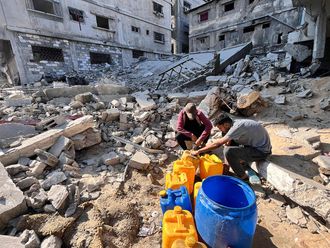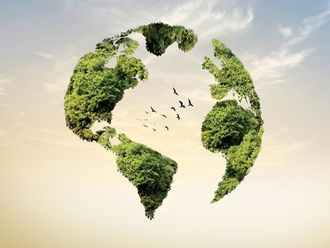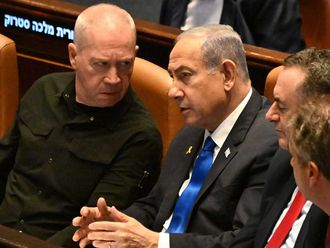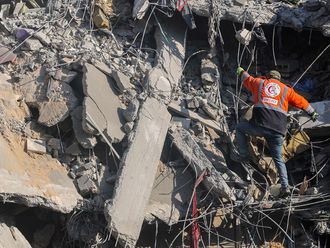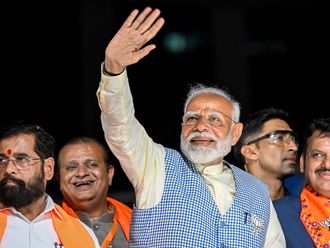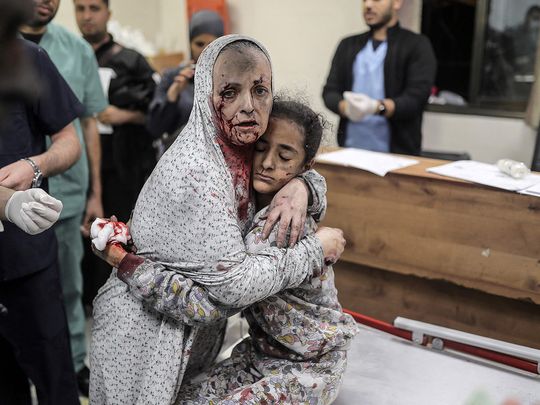
As the death toll in Gaza surged well past 11,000 last week, American Secretary of State Anthony Blinken declared: “Far too many Palestinians have been killed”.
You don’t say!
At a seminal level of relating to this dark chapter in Palestinian history, there is more to the issue than “too many Palestinians” being killed, not to mention displaced and terrorised, a form of destitution that sadly has been a common theme in that history since the catastrophic dismemberment in of Palestine in 1948, a calamity that Palestinians have named the nakba.
What there is rather is an attempt by Israeli political strategists to rip apart the very social fabric that has for generations glued together Palestinians as a nation imbued with a shared collective consciousness.
Rip apart that fabric, these analysts’ thinking has it, and you rip apart their shared beliefs, aspirations and conjectures on the future as well as their sense of peoplehood. That in turn will sap their energy of spirit as a nation.
Nakba over again
That was, lest we forget, the goal these folks pursued during the nakba. Now, three quarters of a century after the fact, they are back, full-throttle, in Gaza, aiming at a second nakba that they hope this time will succeed in turning Palestinians, wherever found, in the homeground or in the diaspora, into a little, leftover people that neither they nor the rest of the world will ever again hear from, read about or care for.
In short, the goal is to turn into forgotten dust the Palestinian people’s sense of peoplehood — a sense that a human community accumulates.
It is futile to attempt ripping apart a society well-entrenched in its collective consciousness, as Palestinian society is, for the effort is tantamount to ripping apart a nation — and, let the record show, Palestinians have shown us over the last century that a people need not have a state to be a nation.
A nation, as philosophers of history, all the way from Ibn Khaldun to Oswald Spengler, were able to demonstrate, have their own built-in, dynamic psyches, which the former called “assabiah” and the latter called “Faustian soul”.
You lash at that sense of élan and you lash at shadows.

Sense of peoplehood
If you cause Palestinian society to fall apart, which Israel is attempting to do in Gaza as we speak and has attempted to do in the West Bank for well over half a century, then where will the parts fall into if not once again back into society, albeit now a transfigured, more cohesive society that alters the individual’s repertoire of consciousness and fosters the emergence there of more complex forms of perception?
What holds a society together is not, as Jane Austen had her contemporaries believe, “good manners” (good Victorian manners, to be sure), and what helps it to maintain hope in a time of catastrophe is not resignation, as fatalists insist, but that society’s assabiah.
A young Palestinian peasant woman lay under a tree, by the wayside, screaming to heaven with labour pain, as her husband ran up and down, flailing his arms, asking the throng, plaintively, 'In the name of God, is there a midwife in your midst?'
Organic solidarity
And Palestinians have shown that they have that in spades. Moreover, when that society faces a common threat, in emotionally-charged times, as Palestinian society is facing today, it will spontaneously see what sociologists call “organic solidarity” — solidarity honed at the whetstone of persecution over the years — coming to the fore, animating its rebellious spirit.
Wars end but the wounds they inflict remain as inherited trauma — as memories. And while to remember, in the words of the French poet Charles Baudelare, “is to suffer”, let’s not forget that it is from suffering that the struggle for survival, for a place in the sun, for the will-to-meaning, stems.
Palestinians everywhere — including those of us diaspora Palestinians watching from afar and to whom the suffering of their people in the homeground is an indivisible part of their identity — will confess to you that they feel today is if that are living through the same phase in their history that their parents (or they themselves as children) had lived during the nakba 75 years ago, when Palestinians found themselves, en masse, fragmented and helpless.
And what Palestinian, who had joined the refugee exodus that year, would not see stark similarities between the Goyaesque images of Gazan refugees (reportedly three quarters of the Strip’s population) scrambling to seek refuge, in the hundreds of thousands, and his or her own experience?
I for one do see the similarities. I still recall the image, from the time I joined that refugee exodus, as a seven-year-old, when Palestinian refugees trekked north from Palestine to the Lebanese border, and a young peasant woman lay under a tree, by the wayside, screaming to heaven with labour pain, as her husband ran up and down, flailing his arms, asking the throng, plaintively, “In the name of God, is there a midwife in your midst?”
And I have refused to excise that image, along with many others like it, from my mind, because it is, well, part of my collective consciousness and sense of peoplehood.
We are continuing to refuse, after all these years, to go away.
It’s a pity that many Israeli leaders have come to view that as an affront, one that warrants the infliction on Palestinian men, women and children unspeakable punishment, one beyond the call of these folks’ putative guilt.
— Fawaz Turki is a noted academic, journalist and author based in Washington DC. He is the author of The Disinherited: Journal of a Palestinian Exile.


